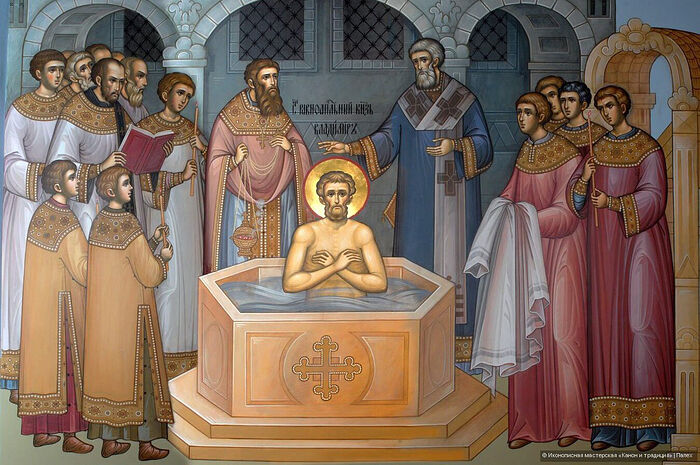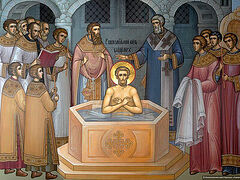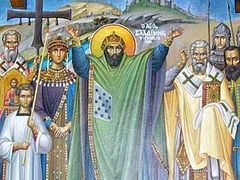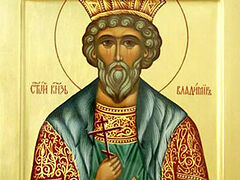The Baptism of Rus’ by Equal-to-the-Apostles Prince Vladimir was an event that took place over a thousand years ago, but it continues to stir the minds of many. Did the prince have the right to decide this for his people? What has Christianity brought to Rus’? We discuss these things with Bishop Pachomy of Pokrovsk and Novouzensk (Saratov Diocese).
—Vladyka, anyone who has studied history from Soviet textbooks remembers that the Baptism of Rus’ was explained by purely economic and political reasons…
—Yes, they would even say that Christianity was alien to Rus’, that it appeared at the flourish of one ruler’s pen. But that is not true. In fact, Christianity was already well known in Rus’; it was widespread not only amongst foreign merchants and travelers, but also amongst our ancestors. Many historians testify to the presence of Christian communities in both Kiev and Novgorod. There were Christians amongst the prince’s army as well as amongst the simple folk.
For Equal-to-the-Apostles Prince Vladimir, receiving Baptism was a political decision, because there were definite prerequisites for the country’s development in this. But we cannot ignore the spiritual reasons for it. The prince himself was a zealous, seeking man. The changes in his life, his relationship to people after Baptism testify to the fact that he related to his choice sincerely and deeply.
In our days, we often hear the assertion that faith is a deeply personal matter for each individual, that it should never be outwardly demonstrated, never mind as a matter of government policy. This relationship to religion, which is now being actively forced on people, appeared rather recently. If we talk about the tenth to eleventh centuries during which Christianity was spread in Rus’, there was nothing of the kind. Moreover, in the ancient world, in medieval Europe, in imperial Russia, and in many modern states in the East, faith is viewed as a unifying idea for the whole nation.
The Holy Spirit proceeds from the apostles, who were gathered together on the day of Pentecost in the upper room at Sion. From that time forth, the Church has always been a group of people bonded by a common faith.
—But for many the question arises: What right does one man have to choose a faith for an entire nation, not only for his contemporaries but also for their descendants?
—The prince in Rus’ was not just a political leader; he was the head of the people, their father. The people listened to the prince not only in matters of faith, but in also in other matters—economic, political, and domestic. Therefore, when the prince received Baptism, it was simply natural for many people to follow his example—a kind of obedience.
It’s today that the right of each individual has been elevated to the rank of absolute dogma. This is a manifestation of the twentieth century—the development of extreme individualism, when in the choice between myself and the nation I always choose myself. In those days, that was not how people saw it. Look at the example of enlightened Europe and recall the slogan in the wars between Protestants and Catholics: “Whoever is in power, that’s whose faith will prevail.” We see that Europe’s experience was not any more democratic than it was for Rus’ during the time of Prince Vladimir.
We have to understand well that Prince Vladimir thought not only about the spiritual, but also the state development of his country, of the cultural benefit for the people. He understood that a Christian nation means strength, development, and entrance into the family of enlightened European nations. Because Christianity, which was being preached in various corners of the world, brough with itself books, scholarly knowledge, and a moral revolution. This was the historical path that God prepared for Russia. We simply had no other choice. Receiving Christianity opened the way to a great culture and history.
—Today you’ll find people who are fascinated by Slavic paganism—not so much its philosophy as its esthetics. They see in it the Russian people’s identity as opposed to the Christianity brought to them by the Greeks.
—I am always amazed by the modern mindset of “enlightened” circles. On the one hand, they argue for a serious culturological, scientific approach. And when they come up against a manifestation of a person’s religious feelings, they say that this is dark ignorance. But when the subject comes up of very dark, ignorant paganism, that is supposedly our history, our freedom.
We must well know that not only to Rus’, but also to other European countries Christianity brought statehood and the foundations of culture. Even so, Christianity itself cannot be a state religion by definition, because the state presupposes a certain mechanism of force, while Christianity gives man freedom.
—People often talk about how Christianity became the culture-forming religion. Can you cite specific examples of this influence?
—What in our culture did not come from Christianity? What is Russian literature? It is something that developed over the course of the eighteenth to nineteenth centuries in the form that the whole world now knows. Why did it become possible? Because over the course of seven or eight centuries before this, Russian book learning (and literacy in general) was based exclusively on Christian enlightenment.
Russian painting developed of course under the influence of European painting, but iconography had a huge influence on it. It is the same for Russian architecture and music. The tragedy of European (including Russian) society consists precisely in the fact that we constantly become ashamed of our own Christianity; we try to hide behind common phrases. And this destroys our identity. What can be offered in exchange for the process which, like it or not, went on over the spread of thousands of years? Our people have already gone through this. We already suffered this myopia at the beginning of the twentieth century when, caught up in ideas of bolshevism and German philosophy, we brought on a horrible tragedy. Perhaps it’s time to learn a lesson from this?
—But what happened happened: Christian tradition has been disrupted, and several generations have grown up without it. Why should we return to it? Perhaps we have to move on? After all, European states cannot no longer be called Christian.
—Can we see any noticeable development in modern European states? And in general, what development are we talking about? Look at the Renaissance era—what bundle of energy, fed with Christian juices! Where can we see any like it today? Everything in this world that acts without the influence of reasonable forces, without the source of energy, is hurdling toward destruction. No matter how stately and strong a tree might be, if you hack away the roots it will not only stop growing—it will simply die.
—On the other hand, today many talk about spiritual rebirth, about a return to patristic traditions, to the source. By this many people mean anything they like, including the study of Russian folk dances. So just what should this spiritual rebirth really be?
—This is a very complicated question, and it can’t be answered definitively. As I see it, any national development is possible only when society returns not just to abstract roots, but to the living source. And religion in any society is this source. Faith forms worldviews and principles of coexistence with other peoples.
The problem is that it is being suggested to us that supposedly we can return to certain roots while removing the religious component from life. In my view, this in impossible in principle. Of course, not all our forebears were truly ideological Christians, and by far not all of them became saints. But the life of the people was always founded upon definite foundational values, which rise to the Absolute. Philosophical teachings, a philosophical relationship to man’s life places no obligations on people. But religion presupposes a system of actions and behavior; after all, faith without works is dead (Jas. 2:26).
—The Millennia of the Baptism of Russia [in 1988] became a sort of threshold after which the Church began to be freed from state oppression. What changed in the Church after that time?
—It’s a little hard for me to judge, because I didn’t fully see that time when the Church was under the oppression of the state authorities with its mechanism of repression. It is better to talk about this with people who experienced the difficulties of that era. Although, every period has its own trials, its own joys and sorrows.
We must understand that the Church is in principle outside of time, outside of political structures; it is above the world. And although the Church lives in various times—periods of persecution, repression, and of prosperity—its preordained purpose remains one and the same: to provide an image of Heaven here, on earth; to provide the opportunity to find this Heaven, to be saved. Every time, every people has its own methods for this salvation—through martyrdom, through patient suffering, or through creativity and development.
Today the Church has received a real freedom that it never had throughout its entire existence—at least in Russia. But the earthly Church, the Church militant, even when it becomes a captive to systems, is not enslaved; Christ leaves each person his own freedom of choice. Saints are possible in any times—monastic saints, martyrs, and new martyrs.
There is no point in constantly comparing one thing with another. Christianity gives people the opportunity to be freed from their dependencies, from their own passions, their own prejudices. We have to stop waiting for the time when it will become easier, when here on earth the age of general well-being will come. We just have to learn to live in today and understand that we should be worrying about our salvation precisely today. The Church here in this world is the Christian’ earthly form life. But our goal is there, in eternal life.








